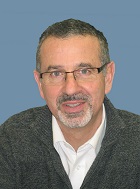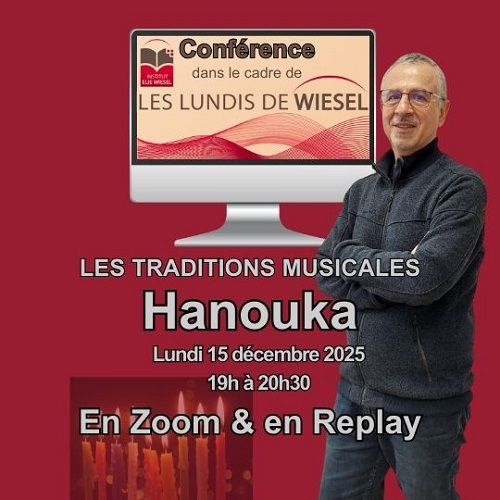
A radio program of the European Institute of Jewish Music hosted by Hervé Roten
MUSIQUES JUIVES D’HIER ET D’AUJOURD’HUI – NOVEMBER 19, 2019, JUDAÏQUES FM (94.8), 21H00. Radio program in French
On the occasion of the release of the CD Jacques Offenbach and friends – From the Synagogue to the Opera, Hervé Roten invites Jacobo Kaufmann, stage director, writer and researcher, and author of several books and articles dedicated to Jacques Offenbach (1819-1880) and his father Isaac Offenbach (1779-1850)
Isaac Offenbach was born in Offenbach-sur-le-Main, near Frankfurt, on October 26, 1779. Orphan when he was very young, he learned music with travelling cantors. In 1802, he settled down in Deutz, a town on the Rhine facing Cologne, and started to make a living by singing in Jewish religious services, but also as a violonist in ballrooms and taverns. In Deutz, where he was called « der Offenbacher », he got married with Marianne Rindskopf. And, following the Napoleon’s decree of 1808, he changed his last name Eberst into Offenbach.
Isaac Offenbach earned his living as a teacher of violin, flute, guitar and singing, and from 1820 as a cantor in the synagogue of Cologne. For thirty years, he wrote liturgical compositions for Shabbat service and Jewish holidays, as well as a music theatre piece, Esther, queen of Persia or The Israelites got away from Haman’s vengeance and other Purim’s songs. He is also the author of several secular pieces, like his Twelve sonatinas for guitar.
Isaac Offenbach passed away on the April 26, 1850, at the age of 71. Most of his musical and literary works are kept at the Hebrew Union College of New York and at the National Library of Jerusalem.
Jacques Offenbach was one of the 9 children of Isaac and Marianne Offenbach. Born in Cologne on June 2, 1819, he left with his father and brother Jules to Paris to start superior music studies. France was then the only country in Europe where a Jew could have a career in music without converting. At the age of 14, Jacques entered the cello class at the Conservatoire de Musique of Paris, and his brother Jules learned violin with Paganini.
On December 1, 1833, the two brothers were hired at the Parisian synagogue Notre-Dame de Nazareth as « in charge of the training and direction of the Choir ». Following a disagreement with the rabbi of the synagogue, their contract was not renewed. Having to work to earn a living, Jacques left the music school after one year and entered the orchestra of the Opéra Comique where he attracted the attention of Jacques Fromental Halévy who gave him composition and orchestration lessons.
From 1839, Jacques Offenbach wrote a few stage music pieces for the Opéra Comique and gave cello concerts. His growing reputation gave him access to the Comédie Française, where he became music director in 1847. In 1855, he opened his own theatre : the Bouffes-Parisiens, where he created several opera-bouffes acclaimed by the public : Orpheus in Hell, The Grand Duchess of Gerolstein, La Vie parisienne, The Bandits… In 1870, Offenbach’s career was interrupted by the Franco-Prussian war. Offenbach turned then to the opera-bouffe-féérie (King Carrot) and to the patriotic opera (The Drum Major’s Daughter). He passed away on the October 5, 1880, a few months before the premiere of the opera which would bring him the recognition he waited so long for, The Tales of Hoffmann – one of the most performed French operas nowadays.
In 1844, Jacques Offenbach converted to Catholicism to marry Hérminie d’Alcain (1827-1887). But Jacques Offenbach grew up with the chants of the synagogue. At the age of 16, he wrote several waltzes on Jewish motifs of the XVth century, called Rebecca (1837, unpublished). And in 1841, on the occasion of the visit to his father in Cologne, he composed two synagogal chorals (Tovo lefone’ho and Ochamnou) for the prayer of confession of Yom Kippur. This Jewish work by Offenbach – that we will hear during this broadcast – was rediscovered about thirty years ago by Jacobo Kaufmann, from original manuscripts by Isaac Offenbach kept in New York and Jerusalem.
A fascinating program, not to miss…
Read Isaac Offenbach’s biography
Read Jacques Offenbach’s biography
Learn more on Jacobo Kaufmann’s book Isaac Offenbach and his son Jacques
Purchase the CD Jacques Offenbach and friends – From the Synagogue to the Opera – Vol.6, Ed. IEMJ, on our online shop

Ethnomusicologist, he quickly developed an interest in the safeguard and digitization of archives, subjects he taught for several years in Reims and Marne-La-Vallée universities.
Author of many articles, books and recordings related to Jewish music, producer of radio programs, Hervé Roten is recognized today as one of the best specialists of Jewish music in the world.





